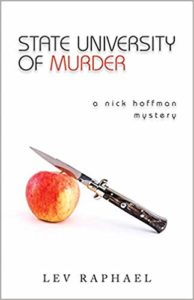In my breakout mystery The Edith Wharton Murders, two rival Wharton societies are brought together in one conference–and murder results. I got the idea at a Wharton conference.
Nobody was killed there, but I think a lot of people had their pride wounded. One of the keynote speakers subtly dissed the attendees for paying so much attention to Wharton (!) when there was another writer this professor considered more important. The keynote speaker went on to praise this lesser-known writer.
That was before smart phones, so nobody was able to look the writer up while the keynote address went on. I’ll always remember how that moment typified the jockeying for position that goes on in academia 24/7. But that’s the mild stuff. Professors undermine their rivals’ reputations with gossip and hostile journal essays, poach each other’s graduate students, launch Twitter campaigns to get them removed from programs or even fired.
Of course it’s all much more entertaining in a mystery if you have actual corpses.
My college mentor, a Wharton bibliographer, was at the conference, and so I wrote her into the book as a best friend and relative of my sleuth Nick Hoffman. He’s been given the thankless task of bringing two warring factions in the Edith Wharton field together and thinks of them as no better than gangbangers with advanced degrees. I invented snark of all kinds, inspired by stories people across the country had told me about Ivory Tower insanity, and motives for murder were easy to come by.
St. Martin’s Press published the book and I met with the editor who was in love with the whole idea at my favorite café near Lincoln Center. I was in New York for the American production of Tom Stoppard‘s stunning play Arcadia. I’d seen the original production in London a few years before, so the night was filled with glamour and excitement for me, and all of that comes back whenever I think about the book.
The mystery earned me my first review in the New York Times and it was a rave: a writer’s dream come true. I will never forget how thrilled I was when my agent faxed the review to me. One of the coolest things I heard about the book’s reception out in the world was that it wasn’t just showing up on mystery shelves at bookstores, it was also being shelved alongside books of Edith Wharton herself.
The Edith Wharton Murders is out now with a fourth publisher and a fun new cover (its fourth!). You can find a review and a book giveaway at the following website: https://www.krlnews.com/2020/09/the-edith-wharton-murders-by-lev-raphael.html

